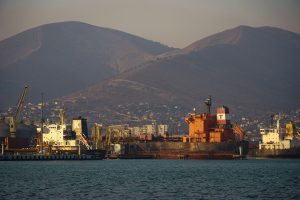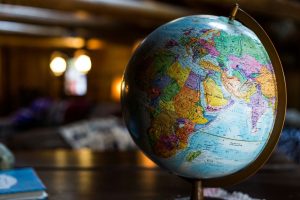The US-Thailand maritime equipment trade plays a crucial role in both economies, contributing to economic growth and job creation. However, navigating the rough seas of this trade relationship presents several challenges. From trade barriers to cultural differences, exporters must be equipped with strategies to overcome these obstacles and ensure successful exports. In this article, we explore the importance of US-Thailand maritime equipment exports, discuss the challenges faced in this trade, provide strategies for success, and highlight emerging trends in the industry.
Key Takeaways
- US-Thailand maritime equipment exports have a significant economic impact, contributing to growth and job creation.
- Trade barriers, such as tariffs, non-tariff barriers, and intellectual property rights protection, pose challenges in US-Thailand maritime equipment trade.
- Understanding the regulatory framework and key players in the industry is essential for successful exports.
- Market research, building strong business relationships, and navigating cultural differences are key strategies for success in US-Thailand maritime equipment exports.
- Emerging trends in the industry include technological advancements, green initiatives, digitalization, and collaborative innovation.
The Importance of US-Thailand Maritime Equipment Exports
The Economic Impact of Maritime Equipment Exports
Maritime equipment exports play a crucial role in the economic growth of both the US and Thailand. These exports contribute significantly to job creation, foreign exchange earnings, and overall economic development. The maritime industry relies on the expertise of companies like DCI to ensure the smooth flow of trade and the efficient operation of ports and vessels.
Challenges in US-Thailand Maritime Equipment Trade
When it comes to US-Thailand maritime equipment trade, there are several challenges that need to be navigated. One of these challenges is the need for effective collection agency to handle distressed accounts. It is vital to utilize a reliable and skilled third-party collection partner to prevent accounts from becoming write-offs. Our team of experts is licensed, bonded, and insured, ensuring that your distressed accounts receivable perform optimally. We offer 24/7 online account access, fast remittances, and electronic payments for your convenience. With our unparalleled results and performance, you can trust us to handle the collection process effectively.
Regulatory Framework for Maritime Equipment Exports
The regulatory framework for maritime equipment exports plays a crucial role in facilitating trade between the US and Thailand. It sets the guidelines and standards that exporters must adhere to, ensuring the safety and quality of the equipment being traded. However, navigating this framework can sometimes be challenging due to various woes.
Key Players in US-Thailand Maritime Equipment Trade
In the US-Thailand maritime equipment trade, the textile industry plays a significant role. With its strong manufacturing capabilities and expertise, the textile industry contributes to the production of high-quality maritime equipment. The industry’s commitment to innovation and sustainability drives the development of advanced materials and technologies for the maritime sector. Additionally, the textile industry fosters strong business relationships with key players in the trade, ensuring a seamless supply chain and efficient distribution of maritime equipment.
Navigating Trade Barriers in US-Thailand Maritime Equipment Exports
Tariffs and Customs Duties
Tariffs and customs duties play a significant role in US-Thailand maritime equipment exports. These fees are imposed on imported goods, affecting the cost and competitiveness of products. Trade payment challenges can arise due to the financial burden of tariffs and customs duties, making it difficult for exporters to maintain profitability. It is crucial for businesses to carefully analyze and plan for these additional costs to ensure smooth trade operations.
Non-Tariff Barriers to Trade
Non-tariff barriers to trade refer to regulations, policies, and procedures that restrict or impede the flow of goods and services between countries. These barriers can include technical standards, product certifications, and customs procedures. They are often put in place to protect domestic industries, ensure consumer safety, or maintain national security. However, they can also create challenges for exporters and increase the cost of doing business internationally.
Intellectual Property Rights Protection
Protecting intellectual property rights is crucial in US-Thailand maritime equipment trade. Counterfeit and pirated products can undermine the reputation and profitability of companies. To safeguard intellectual property, companies should consider the following strategies:
- Registering patents, trademarks, and copyrights in both the US and Thailand to establish legal protection.
- Monitoring the market for any unauthorized use or infringement of intellectual property rights.
- Enforcing intellectual property rights through legal action when necessary.
It is important for companies to be proactive in protecting their intellectual property rights to maintain a competitive edge in the market.
Certification and Standards Compliance
Certification and standards compliance are crucial in US-Thailand maritime equipment exports. Ensuring that products meet the required certifications and standards is essential for gaining market access and building trust with customers. It is important to thoroughly research and understand the specific certifications and standards that apply to your products in both the US and Thailand.
To navigate the complex landscape of certification and standards compliance, consider the following:
- Engage with regulatory bodies and industry associations to stay updated on the latest requirements and changes.
- Collaborate with local partners or consultants who have expertise in certification and standards compliance in Thailand.
- Maintain accurate documentation and records to demonstrate compliance with regulations.
Remember, compliance with certifications and standards is not only a legal requirement but also a competitive advantage that can help differentiate your products in the market.
Strategies for Successful US-Thailand Maritime Equipment Exports
Market Research and Analysis
Market research and analysis is a crucial step in understanding the U.S.A.-Thailand maritime equipment trade landscape. By conducting thorough research, businesses can gain valuable insights into market trends, customer preferences, and competitor strategies. This information can help companies identify potential opportunities and develop effective marketing and sales strategies. Additionally, analysis of market data can provide quantitative information on market size, growth rate, and demand for specific types of maritime equipment.
Building Strong Business Relationships
Building strong business relationships is crucial for success in the US-Thailand maritime equipment trade. Establishing trust and open communication with partners in the Thai market is essential. It is important to understand the cultural nuances and business practices in Thailand to foster strong relationships. Additionally, maintaining a high level of professionalism and delivering on commitments is key to building trust and credibility. Regular communication and face-to-face meetings can help strengthen relationships and address any issues or concerns in a timely manner.
Navigating Cultural Differences
When engaging in US-Thailand maritime equipment exports, it is crucial to navigate cultural differences effectively. Understanding and respecting the cultural norms and practices of both countries can facilitate smoother business transactions and strengthen business relationships. Here are some key considerations:
- Communication: Clear and concise communication is essential to avoid misunderstandings. It is important to be aware of language barriers and use interpreters if necessary.
- Etiquette: Familiarize yourself with the cultural etiquette of both countries, including greetings, gestures, and business customs.
- Negotiation Styles: Be aware of the different negotiation styles and approaches in the US and Thailand. Adapt your negotiation strategies accordingly.
- Time Management: Respect the concept of time in both cultures. Punctuality is highly valued in the US, while flexibility and patience may be more important in Thailand.
Remember, successfully navigating cultural differences can lead to fruitful collaborations and long-term success in the US-Thailand maritime equipment trade.
Logistics and Supply Chain Management
When it comes to Logistics and Supply Chain Management, there are several challenges that exporters face. One of the key challenges is payment challenges, which can delay the smooth flow of goods. It is important for exporters to have a reliable payment system in place to ensure timely payments and avoid any disruptions in the supply chain. Additionally, efficient transportation is crucial in ensuring that goods are delivered on time and in good condition. This includes choosing the right mode of transportation, optimizing routes, and managing inventory effectively.
Emerging Trends in US-Thailand Maritime Equipment Trade
Technological Advancements in Maritime Equipment
Technological advancements in maritime equipment have revolutionized the industry, enhancing efficiency and safety. Innovative technologies such as autonomous vessels and smart sensors have significantly improved navigation and monitoring capabilities. These advancements have led to increased productivity, reduced operational costs, and enhanced environmental sustainability.
Moreover, the integration of big data analytics and artificial intelligence has enabled predictive maintenance and real-time monitoring, allowing for proactive identification of potential issues and timely maintenance. This helps prevent costly breakdowns and ensures smooth operations.
Additionally, the adoption of digitalization and automation has streamlined processes, enabling faster and more accurate data analysis, improved supply chain management, and optimized logistics. This has resulted in faster delivery times, reduced errors, and enhanced customer satisfaction.
Overall, technological advancements in maritime equipment have transformed the industry, offering numerous benefits and opportunities for businesses involved in US-Thailand maritime equipment trade.
Green Initiatives and Sustainability
As the global focus on sustainability and environmental conservation grows, the maritime equipment industry in the US and Thailand is also embracing green initiatives. Companies are increasingly investing in research and development to create environmentally-friendly and energy-efficient equipment. This includes the use of renewable energy sources and the adoption of clean technologies.
In addition to reducing carbon emissions, the industry is also focusing on waste management and recycling. Companies are implementing sustainable practices to minimize waste and maximize resource utilization. This includes the proper disposal of hazardous materials and the promotion of circular economy principles.
To encourage sustainability, governments and industry associations are providing incentives and certifications for companies that prioritize green initiatives. These initiatives not only benefit the environment but also contribute to cost savings and improved reputation for companies in the US-Thailand maritime equipment trade.
Digitalization and Automation in the Industry
Digitalization and automation have revolutionized the maritime equipment industry, bringing numerous benefits and challenges. One key challenge is the issue of payment delays, which can disrupt supply chains and impact cash flow. To address this, companies need to implement efficient payment systems and establish clear communication channels with their partners. Additionally, leveraging technology such as blockchain can help streamline payment processes and enhance transparency. By embracing digitalization and automation, companies can improve efficiency, reduce costs, and stay competitive in the evolving industry.
Collaborative Innovation and Research
Collaborative innovation and research play a crucial role in the US-Thailand maritime equipment trade. Partnerships between companies, universities, and research institutions foster knowledge sharing and technological advancements. These collaborations enable the development of cutting-edge maritime equipment that meets the industry’s evolving needs.
In addition, collaborative research efforts contribute to sustainable practices and environmental protection. By working together, stakeholders can explore innovative solutions to reduce the industry’s carbon footprint and promote green initiatives.
To encourage collaborative innovation and research, industry players should consider:
- Establishing joint research projects to pool resources and expertise.
- Creating technology transfer programs to facilitate the adoption of new technologies.
- Promoting knowledge exchange through conferences, workshops, and seminars.
By embracing collaborative innovation and research, the US-Thailand maritime equipment trade can stay at the forefront of technological advancements and drive sustainable growth.
Emerging Trends in US-Thailand Maritime Equipment Trade. The maritime equipment trade between the United States and Thailand is experiencing significant growth and evolving trends. With the increasing demand for maritime equipment in both countries, there is a growing need for efficient trade practices and innovative solutions. This article explores the emerging trends in this trade sector and highlights the key factors driving its growth. From the adoption of advanced technologies to the implementation of sustainable practices, the US-Thailand maritime equipment trade is witnessing a transformation. As the industry continues to evolve, businesses are seeking reliable partners and comprehensive debt collection solutions to ensure smooth operations and timely payments. Debt Collectors International is a leading provider of debt collection services, offering tailored solutions to businesses involved in the maritime equipment trade. With our expertise and global network, we simplify the debt collection process and help businesses recover outstanding payments. Contact us today to learn more about our debt collection solutions and how we can assist you in navigating the complexities of the US-Thailand maritime equipment trade.
Frequently Asked Questions
What is the economic impact of US-Thailand maritime equipment exports?
US-Thailand maritime equipment exports have a significant economic impact, contributing to job creation, economic growth, and trade balance between the two countries. These exports generate revenue for both US and Thai companies involved in the maritime equipment industry.
What are the challenges in US-Thailand maritime equipment trade?
There are several challenges in US-Thailand maritime equipment trade, including regulatory barriers, trade barriers such as tariffs and customs duties, non-tariff barriers, intellectual property rights protection, and certification and standards compliance.
What is the regulatory framework for maritime equipment exports between the US and Thailand?
The regulatory framework for maritime equipment exports between the US and Thailand includes compliance with international trade agreements, customs regulations, export control laws, and industry-specific regulations governing the export of maritime equipment.
Who are the key players in US-Thailand maritime equipment trade?
The key players in US-Thailand maritime equipment trade include manufacturers, exporters, importers, distributors, shipping companies, freight forwarders, and government agencies responsible for trade facilitation and regulation.
What are the tariffs and customs duties involved in US-Thailand maritime equipment trade?
The tariffs and customs duties involved in US-Thailand maritime equipment trade vary depending on the specific equipment and its classification. It is important to consult the customs authorities or trade experts to determine the applicable tariffs and duties.
How can companies protect their intellectual property rights in US-Thailand maritime equipment trade?
Companies can protect their intellectual property rights in US-Thailand maritime equipment trade by registering their patents, trademarks, and copyrights in both the US and Thailand. Additionally, they can establish contractual agreements and enforceable provisions to safeguard their intellectual property rights.





